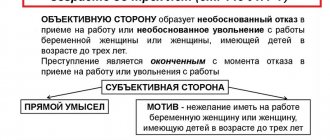What is civil law
Civil law is a set of legislative acts enshrined in branches of law, incl. in Federal Law No. 51 “Civil Code” (Civil Code of the Russian Federation) in order to protect civil rights and freedoms, as well as for the purpose of legal and reasonable judicial proceedings in civil disputes.
Civil law is one of the most important components of any legal system and the most developed, system-forming branch of private law.
The rules of civil law regulate the relations that develop between citizens, organizations and the state regarding various material benefits (property, works, services, rights to the results of intellectual activity), as well as relations to protect intangible benefits (life and health, honor and dignity, etc.). d.).
The term civil law
originates from the Roman “civil law” (jus civile), which meant the law of the original Roman citizens - the quirites. Later, in the Middle Ages and right up to the bourgeois revolutions, it acted either as Roman law, opposed to church law and customs, or as personal law and the law of monetary interests, as opposed to criminal law.
Social relations that constitute the subject of civil law are dispositive and mutually evaluative in nature. Such an assessment can be correctly formed only if the assessing parties are equal, which expresses the dispositive nature of civil legal relations (in more detail below). Legal equality of the parties means that none of the parties in a civil legal relationship can predetermine the behavior of the other party only by virtue of the position it occupies in this legal relationship, such as, for example, in an administrative or criminal legal relationship. This method provides participants with independence and independence in decision-making, contributes to the manifestation of entrepreneurial initiative and the development of civil circulation.
Civil law is a branch of law
the purpose of which is to regulate commodity and monetary relations, as well as other personal non-property relations related to property. In accordance with paragraph 1 of Article 1 of the Civil Code of the Russian Federation, civil legislation is based on the recognition of the equality of participants in the relations regulated by it, the inviolability of property, freedom of contract, the inadmissibility of arbitrary interference by anyone in private affairs, the need for the unhindered exercise of civil rights, ensuring the restoration of violated rights, their judicial protection.
Article 2 of the Civil Code of the Russian Federation determines the legal status of participants in civil transactions, the grounds for the emergence and procedure for the exercise of property rights and other real rights, rights to the results of intellectual activity and equivalent means of individualization (intellectual rights), regulates relations associated with participation in corporate organizations or with management of them (corporate relations), contractual and other obligations, as well as other property and personal non-property relations based on equality, autonomy of will and property independence of the participants. This branch of law regulates legal relations between individuals and legal entities, the state and other entities.
Civil law contains general provisions,
important for all civil relations, for example, on the limitation period, as well as rules on property rights, the law of obligations, copyright, the right to invention, and inheritance law.
The concept of Civil Law as a branch of law (basic definition)
First, let's expand on the concept of civil law from the point of view of the branch of law. The term “ Civil Law ” is a set of legal norms regulating property and personal non-property relations arising between subjects of civil law, which are based on the equality of the parties, as well as economic independence, in order to implement the legitimate interests of each of them and organize economic relations in society.
The concept of Civil Law as a science
Now let’s expand on the concept of civil law from the point of view of science (civil science or civil science). The term Civil Law as a science is a set of concepts, views, theories, ideas, opinions and ideas regarding the branch of civil law, systematized into a single scientific knowledge (teaching).
Reflection in the decisions of the Supreme Court
The essence of the article is not one that represents any intrinsic value in relation to the essence of disputes, therefore, in judicial rulings of the RF Armed Forces, it is most often mentioned in the list of all important articles that define the subject of consideration. For example, you may encounter the phrase “guided by Articles 23 of the Civil Code of the Russian Federation.” Art. 2 of the Civil Code of the Russian Federation indicates the nature of the relationship, and Art. 23 of the Civil Code of the Russian Federation states that citizens have the right to engage in entrepreneurial activities without forming a legal entity. This means that some case is being considered related to controversial situations that arose during the work of the individual entrepreneur. Their specifics may be related to other articles of the Civil Code, various legal acts, including presidential decrees and government regulations. Art. 2 of the Civil Code of the Russian Federation is given only to emphasize that the essence of the case is related to the Civil Code and the Russian Federation, and not to the Criminal Code or the Administrative Code.
What are civil human rights
Human civil rights are a set of inalienable rights and freedoms of a citizen, the presence of which, along with responsibilities, forms a person’s legal capacity (Part 1 of Article 17 of the Civil Code of the Russian Federation).
In accordance with Art. 8 of the Civil Code of the Russian Federation, civil rights arise from the grounds specified in the law and other legal acts, as well as from the actions of citizens and legal entities, which, although not provided for by law or such acts, but due to the general principles and meaning of civil legislation give rise to civil rights, and exactly:
- from contracts and other transactions, both directly provided for by law and not contradicting it;
- from decisions of meetings in cases provided for by law;
- from acts of state bodies and local government bodies, which are provided by law as the basis for the emergence of civil rights and obligations;
- from court decisions establishing civil rights and obligations;
- as a result of the acquisition of property on grounds permitted by law;
- as a result of the creation of works of science, literature, art, inventions and other results of intellectual activity;
- due to harm to another person;
- due to unjust enrichment;
- due to other actions of citizens and legal entities;
- as a result of events with which the law or other legal act associates the onset of civil consequences.
Civil rights are characterized by the following features:
- arise from the birth of a person (Part 2 of Article 17 of the Constitution of the Russian Federation);
- may be limited on the basis of federal law and only to the extent necessary in order to protect the foundations of the constitutional system, morality, health, rights and legitimate interests of other persons, ensuring the defense of the country and the security of the state (Part 3 of Article 55 of the Constitution of the Russian Federation , part 2 of article 1 of the Civil Code of the Russian Federation);
- A citizen’s refusal of his rights entails their termination only in cases provided for by law (Part 2 of Article 9 of the Civil Code of the Russian Federation).
Otherwise, citizens can freely exercise their rights (Part 1, Article 9 of the Civil Code of the Russian Federation), if this does not violate the legal rights and freedoms of other persons (Part 3, Article 17 of the Constitution of the Russian Federation).
Types of civil (personal) human rights
Civil rights, depending on the object, can be divided into tangible and intangible (Article 128 of the Civil Code of the Russian Federation). The current legislation includes rights in relation to things, including cash and documentary securities, other property, including non-cash funds, uncertificated securities, property rights; results of work and provision of services; protected results of intellectual activity and means of individualization equivalent to them (intellectual property).
Intangible rights include the right to life and health, personal dignity, personal integrity, honor and good name, business reputation, privacy, inviolability of home, personal and family secrets, freedom of movement, freedom to choose a place of stay and residence, the name of a citizen, authorship, other intangible benefits that belong to a citizen from birth or by force of law, not alienated or transferred in any other way (Article 150 of the Civil Code of the Russian Federation).
Objects of civil law
The objects of civil law are material and intangible benefits or the process of their creation, which constitute the subject of activity of subjects of civil law.
What is the subject of civil law
Subject of civil law
- these are
property and associated personal non-property relations of civil law
The subject of civil law is social relations regulated by civil law. These legal relations are divided into two types:
- property relations, that is, relations arising regarding various material goods (things and other property, as well as works and services);
- personal non-property relations, whether or not related to property relations.
What refers to the sources of civil law
Sources of civil law
is a system of legal acts and customs that consolidate and protect civil legal relations from abuse, violations and other illegal actions.
Types and groups of sources of civil law
The following types of sources of civil law
:
- legislation (the Constitution of the Russian Federation; the Civil Code of the Russian Federation and other federal laws adopted in accordance with it (clause 2 of article 3 of the Civil Code of the Russian Federation); decrees of the President of the Russian Federation (clause 3 of article 3 of the Civil Code of the Russian Federation), resolutions of the Government of the Russian Federation (clause 4 of art. 3), regulations of ministries and other federal executive authorities (clause 7 of article 3) [article 3 of the Civil Code of the Russian Federation]);
- international treaties in which the Russian Federation participates (Article 7 of the Civil Code of the Russian Federation);
- business customs and other customs recognized by law (Article 5 of the Civil Code of the Russian Federation).
In turn, they can be divided into two groups of sources of civil law
:
- regulatory legal acts (laws, decrees, regulations, instructions, contracts);
- legal customs are sources of non-normative nature (business customs).
Principles of civil law (concept and types)
So, let’s expand on the concept of “ Principles of civil law ” - these are the basic principles of civil law, the basic principles and provisions of civil law, expressing the internal essence of legal relations in the field of civil law.
Let us list the principles of civil law themselves:
- The principle of the inadmissibility of arbitrary interference in private affairs characterizes civil law as private law. It is addressed primarily to public authorities and their bodies, whose direct, direct intervention in private affairs, including in the economic activities of participants in property relations - commodity owners, is now permissible only in cases expressly provided for by law. In the sphere of personal non-property relations, this principle is also specified in the provisions on the inviolability of private life, personal and family secrets of citizens (Articles 23 and 24 of the Constitution of the Russian Federation). The implementation of the requirements of this principle is facilitated by the rules of legislation on the property liability of public authorities for illegal interference in civil legal relations (Article 16 of the Civil Code), as well as on the possibility of the court invalidating acts of public authority or their non-application when resolving a dispute (Articles 12 and 13 of the Civil Code) .
- The principle of legal equality characterizes the legal status (status) of participants in civil legal relations. They do not have any coercive power in relation to each other, even if a public legal entity acts in this capacity. On the contrary, they all have the same legal capabilities and, as a general rule, their actions are subject to the same civil law rules. This provision is also based on the need to ensure equality of subjects of commodity exchange (commodity owners). In civil law there are also necessary exceptions to this principle. Thus, civil law in some cases establishes special rules for entrepreneurs, imposing more stringent and increased requirements on them as professional participants in turnover. For citizen-consumers in their relationships with entrepreneurs, on the contrary, additional legal guarantees are provided for the observance of their interests (as happens, for example, when concluding so-called public contracts in accordance with the rules of Article 426 of the Civil Code).
- The principle of inviolability of property, both private and public, means ensuring that owners have the opportunity to use the property they own in their own interests, without fear of its arbitrary seizure or prohibition or restrictions on use. Its fundamental importance for the organization of property turnover, the participants of which act as independent commodity owners, is obvious. No one can be deprived of their property except by a court decision (Part 3 of Article 35 of the Constitution of the Russian Federation), adopted on legal grounds. Confiscation of property in the public interest is also allowed only in cases expressly established by law and with mandatory preliminary equivalent compensation. Thus, this principle does not completely exclude cases of seizure of property from the owner, but makes them a necessary and strictly limited exception to the general rule. The operation of this principle excludes the possibility of both unjustified appropriation of someone else’s property and new “redistributions of property”, be it the return of property to the “previous owners” (“restitution”) or its forced seizure and redistribution in favor of new owners. It is designed to guarantee the stability of property relations that form the basis of property turnover. As for the redistribution of formerly public property through its privatization, it reflects the will of the public owner himself and therefore cannot be considered a violation or exception to the principle in question.
- The principle of freedom of contract is fundamental for the development of property (civil) turnover. In accordance with it, subjects of civil law are free to enter into an agreement, i.e. in choosing a counterparty and in determining the terms of one’s agreement, as well as in choosing one or another “model” (form) of contractual relations (Article 421 of the Civil Code). As a general rule, coercion to conclude an agreement, including from government bodies, is excluded. At the same time, the operation of this principle in almost all legal orders has known and knows certain exceptions. The law provides, for example, that a credit institution cannot refuse an offer to conclude a bank account or bank deposit agreement (clause 2 of Article 834 and clause 2 of Article 846 of the Civil Code), established in the interests of clients. There are other cases when one of the parties has the right to forcefully demand the conclusion of an agreement, in particular when supplying goods for government needs (Articles 445, 527 and 529 of the Civil Code). The parties may voluntarily undertake an obligation to conclude an agreement in the future, and then demand its forced execution.
- The principle of discretion in civil law means the ability of participants in regulated relations to independently, at their own discretion and in accordance with their interests, choose options for appropriate behavior. Thus, in the overwhelming majority of cases, they independently decide whether or not to enter into certain civil legal relations, to demand or not to demand the fulfillment of obligations by the counterparty, to seek judicial protection of their rights or not, etc. At the same time, refusal to exercise or protect one’s right usually does not lead to its obligatory loss (clause 2 of Article 9 of the Civil Code). Such freedom of choice presupposes the initiative of civil society subjects in achieving their goals. Its downside is, as a general rule, the absence of any special, including state, support in the implementation of private interests and the participants themselves bear the risk and all other consequences of their actions (as should happen, for example, with “deceived investors” of various “financial pyramids”, losers in the lottery or roulette, etc.). The task of the state in private relations is to establish clear and consistent “rules of the game” for their participants, excluding the deliberate dishonesty of individuals, and the use of these rules in accordance with the principle of discretion is entirely up to the participants themselves. An obvious exception here is when guardians and trustees of minors or sick and elderly citizens act in civil legal relations, whose task is precisely to help their wards in the implementation and protection of their rights and interests.
- The principle of unimpeded exercise of civil rights presupposes the elimination of any unreasonable obstacles in the development of civil circulation. It is specified, in particular, in the freedom of entrepreneurial and other economic activities not prohibited by law (Article 34 of the Constitution of the Russian Federation), as well as in the freedom of movement of goods, services and financial assets across Russian territory (clause 3 of Article 1 of the Civil Code), which characterizes freedom property turnover. In this case, the law can establish only some restrictions necessary in the public interest, for example, licensing of certain types of business, prohibition of market monopolization or unfair competition, etc. The effect of this principle is also important from the standpoint of eliminating artificial, bureaucratic obstacles in the implementation the right to protect one’s interests, for example, in excluding or limiting the mandatory pre-trial (in particular, claims) procedure for considering certain disputes.
- The principle of prohibition of abuse of right can be considered a general exception (“general clause” or reservation) from general private law principles. In accordance with it, unlimited freedom in the use of the rights available to participants in civil legal relations is excluded. The law always has certain boundaries both in content and in the ways of implementing the possibilities it provides. Such boundaries are an integral property of any law, because in their absence, law turns into its opposite - arbitrariness. Thus, the owner has the right, at his own discretion, to take any actions in relation to his property that do not contradict the law and do not violate the rights and interests protected by law of other persons (Clause 2 of Article 209 of the Civil Code). The owner of land or other natural resources exercises his rights freely if this does not cause damage to the environment and does not violate the rights and legitimate interests of other persons (Part 2 of Article 36 of the Constitution of the Russian Federation, Clause 3 of Article 209 of the Civil Code). Such prohibitions cannot but be recognized as well-known restrictions on the rights of the owner, although caused by obvious necessity. Similar restrictions and prohibitions are easy to find in the law of obligations and in other sub-branches of civil law. For example, the mentioned prohibition on an entrepreneur as a party to a public contract to refuse to conclude it essentially constitutes a restriction of his contractual freedom. The same can be attributed to antimonopoly prohibitions, prohibitions on the abuse of a dominant position in the market, etc. This principle also underlies the declaration of invalidity of enslaving and some other transactions (Articles 169 and 179 of the Civil Code). In general, the prohibition of improper exercise of rights, including abuse of rights, is established by Art. 10 GK. Such general rules are known in one form or another to all developed legal systems. Their necessity is beyond doubt, but the problem of clearly limiting their content and use remains one of the most acute and controversial in civil law.
- The principle of full protection and judicial protection of civil rights generally characterizes the law enforcement function (task) of civil law regulation. In accordance with it, participants in civil legal relations are provided with ample opportunities to protect their rights and interests: they can resort to both judicial protection and self-defense, as well as the use of some other measures that have an adverse property impact on faulty counterparties. Civil law contains a wide range of law enforcement tools that allow its subjects to effectively protect any of their rights and legitimate interests (Articles 11–15 of the Civil Code). Most of these funds are of a property nature, corresponding to the nature of the prevailing relations in the subject of regulation. Their use is usually aimed at restoring violated rights and (or) property compensation to victims. The judicial protection of civil rights, independent of the influence of participants, and the limitation (exclusivity) of their administrative and legal protection (clause 2 of Article 11 of the Civil Code) are due to the specifics of private law.
Civil law system (concept and parts)
This section will help you understand what the civil law system is and what it consists of, or rather, we will describe the two existing civil law systems as general and special parts.
Concept Civil law system
So, let’s expand on the concept of “ Civil Law System ” - a systematized, structured and interconnected set of legal norms (sectors, sub-sectors, institutions, sub-institutions) based on the unity of the subject and method of civil law.
Parts of the civil law system (general and special)
The system of the civil law branch has parts and essentially includes two parts, in other words, the civil law system is a general and a special part.
The civil law system is divided into
:
- General part;
- A special part.
The general civil law system includes five (5) main points. Thus the general part
The civil law system includes basic provisions on:
- concepts and principles of civil law;
- subjects of civil law (participants in civil legal relations);
- objects of civil rights;
- emergence, change and termination of civil legal relations;
- implementation and protection of civil rights;
- terms in civil law;
- as well as some other general rules applicable to all civil legal relations.
And the special part
civil law is divided into:
- Property law, which formalizes the ownership of things (property) to participants in civil legal relations as a necessary prerequisite and result of property turnover; it can highlight such basic institutions as: – general provisions,
- - ownership,
- – limited real rights;
- – “intellectual property” (copyright, “related rights”, invention law),
- – common part,
- – general provisions on inheritance,
- – personal non-property rights of creators (authors) of the results of intellectual activity,
Termination of civil legal relations
The basis for termination of civil legal relations is a legal fact. A legal fact is a certain circumstance that, according to the law, may have legal consequences. Including termination of legal relations.
Based on the criterion of legal consequences, legal facts can be law-terminating, law-forming and law-changing. Facts are also classified as negative and positive. The first category includes those facts, the absence of which caused termination or other legal consequences. The second is a category that caused legal consequences by its presence.
Author of the article
Functions of civil law (concept and types)
The section presented to you will help you understand what the functions of civil law are and what they consist of, or rather, we will describe the types of functions of civil law.
Concept Functions of civil law
So, let’s expand on the concept of “ Functions of civil law ” - these are the main directions of its activity, determined by its subject, method and basic principles of civil law regulation.
Types of functions of civil law
Civil law plays a diverse role in the life of society. At the same time, it is necessary to highlight the main functions that directly express the main directions of its regulatory role, the features of its subject, the method of regulation and its basic principles. The most significant are the following two main functions in the areas of legal regulation carried out by this branch of law.
Basic functions of civil law ( types of functions of civil law
):
- Regulatory function. It consists in providing participants in regulated relations with opportunities for their self-organization and self-regulation.
- Protective function. Its primary goal is to protect the property and non-property interests of participants in civil transactions. It also sets itself a preventive and educational (preventive) task, consisting of stimulating and organizing such behavior of participants in regulated relations that would exclude unjustified infringement or violation of other people's interests.
The concept of corporate legal relations
Corporate relations include those relations that are regulated by corporate law. All types of civil legal relations are carried out on the basis of the principles of free will and equality. They are regulated by civil law and are of an organizational nature. In essence, this is a system of relations that are formed between participants in corporations, joint-stock companies, between management and individual employees, and government bodies.
The purpose of legal relations and the use of civil law norms is to find the most appropriate solution to the problem within the framework of the law, to find a compromise solution, to resolve property issues and property issues.
Civil rights protection
Protection of civil rights is a mechanism for implementing measures to protect subjective civil rights and interests.
There are two main forms of protection:
- non-jurisdictional;
- jurisdictional.
A non-jurisdictional form of protection is carried out independently by a private individual whose rights are violated or disputed. The jurisdictional form can be implemented by a state or other authorized body (judicial and administrative procedures for the protection of civil rights).
Forms of rights protection:
- administrative;
- judicial;
- self-defense.
Protection of civil rights administratively is carried out only in cases provided for by law.
Methods of self-defense must be proportionate to the violation and not go beyond the actions necessary to suppress it. Examples of actions in self-defense include necessary defense and extreme necessity.
Ways to protect civil rights
Article 12 of the Civil Code of the Russian Federation defines methods of protecting civil rights , which are traditionally understood as measures provided for by law aimed at suppressing the violation or challenging of subjective civil rights and eliminating the consequences of their violation. Moreover, contained in Art. 12 of the Civil Code of the Russian Federation, the list of methods for protecting civil rights, formulated as open (non-exhaustive), is limited to indicating that other methods can be used provided they are mentioned in the law.
Judicial practice has often resorted to expanding this list, in particular, allowing the possibility of filing a claim to declare a void transaction invalid or a claim to recognize the contract as not concluded.
Protection of civil rights is carried out by:
- Recognition of the right and restoration of the situation that existed before the violation of the right
- Invalidation of a contested transaction
- Invalidation of an act of a state body or local government body
- Self-defense rights (methods of self-defense must be proportionate to the violation and not go beyond the actions necessary to suppress it).
- Compensation of losses and collection of penalties
- Compensation for moral damage
The listing of the most common and frequently used methods of protecting rights, firstly, guides participants in the trade to choose the most optimal method of protecting rights for them, and secondly, it prevents the use of protective structures that are not only erroneous, but also contrary to civil legislation, its general principles and sense.
The universal method of protecting civil rights is enshrined in Art. 15 of the Civil Code of the Russian Federation, dedicated to compensation for losses. At the same time, compensation for damages within the meaning of this article is reasonably considered as a form of civil liability for unlawful actions. The same can be said about Art. 16 of the Civil Code of the Russian Federation, which provides for compensation for losses only for unlawful actions of state bodies. However, in modern civil circulation, there are cases when the law establishes the possibility of compensation for property losses caused not by offenses, but by lawful actions (for example, seizure of property for state needs, lawful unilateral refusal of a contract, etc.). For such cases, the mechanism for compensation of losses established by Art. 15 of the Civil Code of the Russian Federation, should not be applied. At the same time, the Civil Code of the Russian Federation does not contain general rules establishing a mechanism for determining the amount of compensation in cases where property losses were caused by lawful actions. This problem also requires a legislative solution.
The main principle of civil law is the principle of the permissible orientation of civil law regulation
- Subjects of civil law can perform any actions not prohibited by law, which expresses the general legal capacity of citizens and commercial organizations. The main requirement for such actions: they must not contradict the basic principles and meaning of civil legislation, i.e., its principles.
- Subjects of civil law exercise their rights at their own discretion, i.e. in their own interests (Clause 1, Article 9 of the Civil Code). This means that authorities and other persons do not have the right to force participants in civil legal relations to exercise or protect their subjective rights, or to impose sanctions on them for neglecting the right to protection.
The Civil Code of the Russian Federation considers relations that can be expressed in money
All value relations are divided into those that assign rights to someone, expressed statically and dynamically. For example, a certain person owns real estate which he rents out. The essence of contractual relations with tenants does not deprive him of property rights to his property. They remain constant throughout the life of the face. If the transaction is concluded with the right of redemption, then the rights are transferred to the lessee as he fulfills his obligations.
Rights to texts, program codes, photographs and all objects of creative activity can also be considered property rights. In this case, this means the possibility of making a profit from the sale of the fruits of creative labor, but not the creative process itself. Moral rights remain with the author and are not subject to alienation, but this does not mean that a writer who has sold the right to publish a text to a literary agent can do this a second time if the terms of the contract indicate the exclusive rights of the buyer.
Basic definitions (concepts) in civil law
Concept Objects of civil rights
Concept (definition) “Objects of civil rights”
in civil law, these are objectified material and intangible benefits, in relation to (regarding) which civil rights and obligations arise, civil legal relations take shape and operate.
Concept Types of things
Concept (definition) “Kinds of things”
in civil law - these are groups of things, other objects, distinguished by their legally significant properties and connections.
There are immovable
and
movable
types of things.
Concept of Security
Concept (definition) “Security”
in civil law, it is a document certifying, in compliance with the established form and mandatory details, property rights, the exercise and transfer of which are possible only upon presentation of it (this document) (Article 142 of the Civil Code of the Russian Federation).
Concept Invalidity of transactions
Concept (definition) “Invalidity of a transaction”
in civil law - this is its depravity, that is, an action, even if it is a transaction or is only called a “transaction,” but committed with such violations provided for by law that make it initially void or voidable, as a result of which it either does not give rise to those legal consequences , which the subjects pursued, or these consequences may not occur by court decision.
Concept of Representative Office
Concept (definition) “Representation”
in civil law - a relationship according to which a transaction made by one person (representative) on behalf of another person (represented), by virtue of authority based on a power of attorney, an indication of the law or an act of an authorized body (state, local government), directly creates, changes and terminates the civil rights and obligations of the represented person (Article 182 of the Civil Code of the Russian Federation).
For reference: Representation services in court.
The concept of limitation period
Concept (definition) “Limitation period”
in civil law - this is the period for judicial protection of rights at the claim of a person whose right has been violated. For reference: What is the statute of limitations?
Property Concept
Concept (definition) “Property”
in civil law - comprehensive, exclusive, absolute possession of things, other benefits, expressing through the corresponding subjective rights a direct connection (“without intermediaries”) of a person with a thing, other benefit. Property is the basis of people’s life, and largely determines the very basis and possibilities for the development of society, its modernization, meeting the needs of society, the rights and interests of people.
Concept of Treasure
Concept (definition) “Treasure”
in civil law, these are money or other valuable objects buried in the ground or otherwise hidden, the owner of which cannot be identified or, by virtue of the law, has lost the right to them (Article 233 of the Civil Code of the Russian Federation).
Concept of land ownership
Concept (definition) “Ownership of land”
in civil law, it is ownership of a highly socially and economically significant material good (land), which, along with the Civil Code of the Russian Federation, is regulated by a special branch of legislation - the Land Code and other land laws.
Concept of Commitment
Concept (definition) “Obligation”
in civil law - this is a civil legal relationship, by virtue of which one person (debtor) is obliged to perform a certain action in favor of another person (creditor), such as: transfer property, perform work, pay money, etc., or refrain from a certain actions, and the other party, the creditor, has the right to demand that the debtor fulfill his obligation (Article 307 of the Civil Code of the Russian Federation).
Concept of Contract
Concept (definition) “Agreement”
in civil law, it is an agreement between two or more persons to establish, change or terminate civil rights and obligations (Article 420 of the Civil Code of the Russian Federation).
For reference: What is a contract.
The science of civil law studies the laws of civil law regulation of social relations. The subject of its study: the norms of civil law embodied in acts of civil legislation, their interaction with social relations, the practice of their application. Results of the study: doctrine of civil law, theories, concepts, ideas, concepts...







